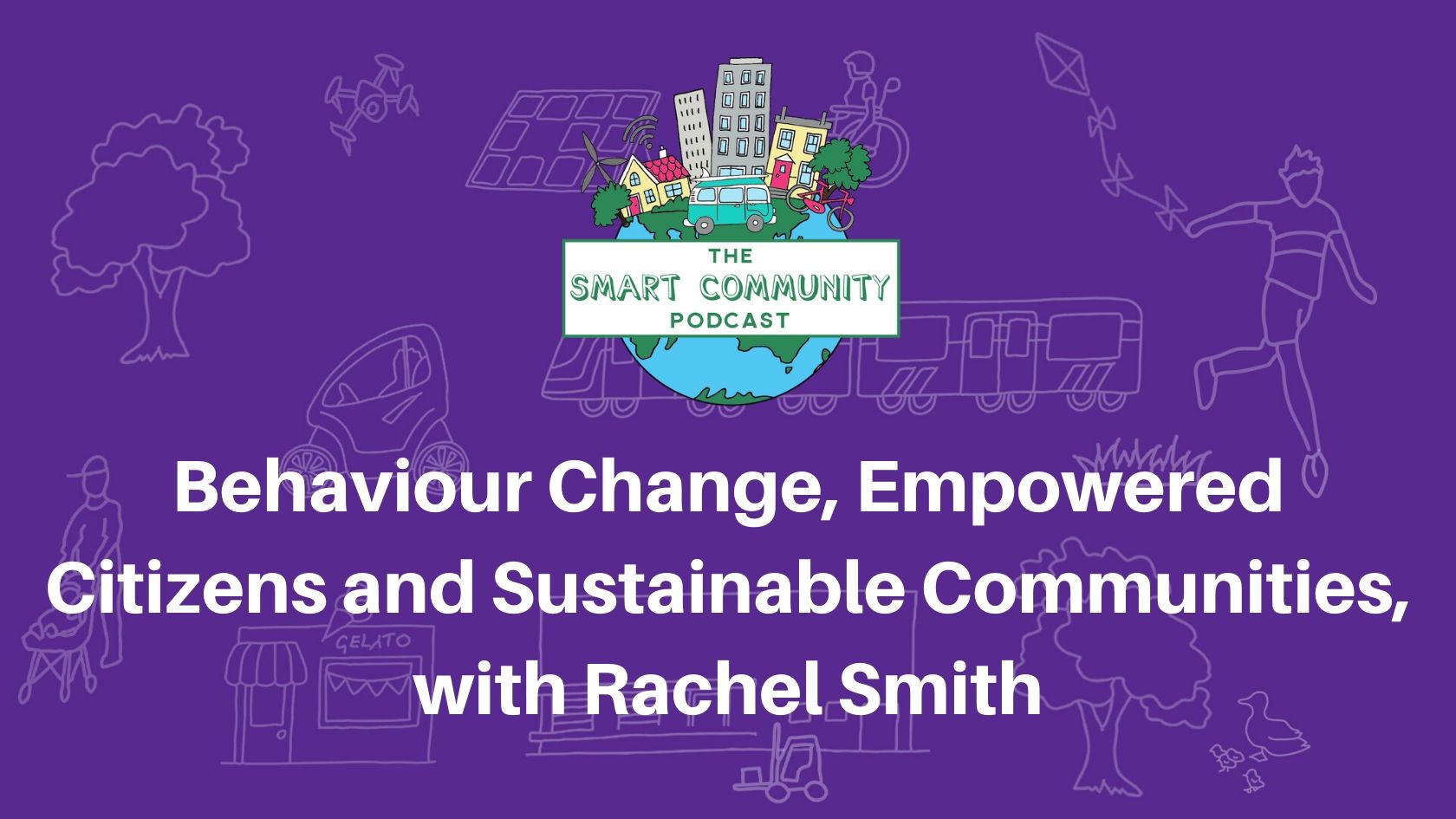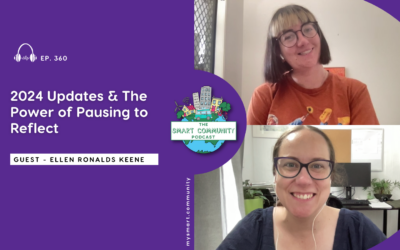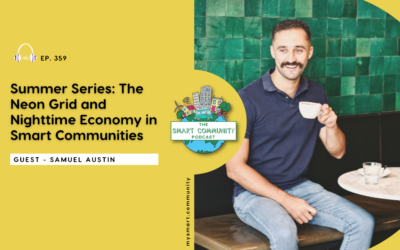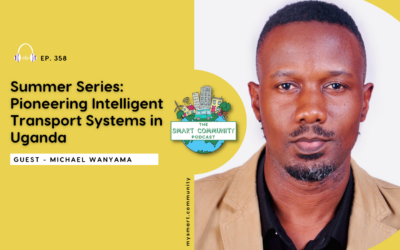In this episode I have a fantastic conversation with Rachel Smith, who is a previous podcast guest, and also a transport planning and demand management consultant. This episode is actually the audio from the video interview I did with Rachel, which is part of the series I’ve been doing on YouTube catching up with previous guests during this time of much change in the world. So if you want to see those interviews you can head on over to our YouTube channel to catch up with what previous guests like Ryan McManus, Debbie Reynolds, Sally Illingworth, and Jonathan Reichental have been getting up to in the last few months.
In this episode Rachel and I chat about the work she does in demand management and why it’s important to Smart Community approach, plus what crises can show us about how we can use resources in Smart ways. We discuss what COVID has exposed about the way people live, and the relationship between consumerism and mobility/transport. Rachel and I also talk about why it’s so important to have foundational systems that underpin the sexy tech solutions like Mobility as a Service, as well as involving end users in designing the solutions so we’re not just giving more options to people who already had options and continuing to leave out the people with the most at stake. We cover the reasons we should be communicating technical things and important decisions in plain English to the public, how we can encourage more informed and engaged citizens, and the power of government directives to shape public behaviour. Rachel also tells us what she learned from her research and the three things required for human behaviour change. We finish our chat discussing why we should forget our fear of failure and put our best and most innovative ideas for post-COVID life forward so we can shape the future. Because this wasn’t a usual podcast interview, Rachel doesn’t tell us where to connect with her at the end of the episode, but you can find her on LinkedIn or at her website, and the links are in the description of this episode. As always, we hope you enjoy listening to this episode as much as we enjoyed making it.
Listen here:
What we cover in this episode:
- Rachel’s background and work as a consultant specialising in transport planning and demand management
- What COVID has exposed about the way people live
- The relationship between consumerism and mobility/transport
- What crises can show us about how we can use resources in a Smart way
- What Smart Communities means to Rachel and why Demand Management is crucial
- The need to focus on the mundane, foundational systems that underpin the sexy tech solutions like MaaS
- How Rachel sees MaaS happening in Australia and why the Smart Community approach is needed
- The challenge of solutions for those who already had solutions, and continuing gaps for people who have the problems
- How data can help solve mobility problems and why we still need the community/end users involved in solutions
- The importance of communicating technical things and important decisions in plain English to the public so you have buy in from informed, empowered, active citizens
- How Rachel is faring in COVID19 and what she’s seen change/how she’s pivoted
- The power of government directives with a powerful emergency reason behind it to influence public behaviour
- Why we should think carefully about using government directives intentionally to shape public behaviour going forwards
- What Rachel learned from her research and the three things required for human behaviour change
- Why we should put our best ideas together now to make our lives and communities stronger and more resilient going forwards
- Forgetting our fear of failure and exploring ideas for post-COVID life such as alternative tourism models
Quotes:
“Only a crisis‐ actual or perceived‐ produces real change. When that crisis occurs, the actions that are taken depend on the ideas that are lying around. That, I believe, is our basic function: to develop alternatives to existing policies, to keep them alive and available until the politically impossible becomes politically inevitable.” ~ Milton Friedman (mentioned by Rachel in this episode)
“As we go forward or life beyond COVID, it’s really important that we change the way that we use and manage public, private and community infrastructure, resources and services so that everything is more sustainable and we can afford to fund things and to keep them going…We’ve really seen that in the COVID crisis, where it’s clear that businesses and community groups just don’t have that buffer of cash flow or funding to keep something going, which is really sad. So making things sustainable as in that they’re long lasting.” ~ Rachel
“One of the things that we’ve learned is that our cities and communities have built been built around using the car, driving to the retail centre, buying loads of stuff, taking it home, then needing to buy a bigger house further away, and needing to commute further. Everything costs more and more. COVID has actually given us a once in a lifetime opportunity to stop everything. And it’s really hard for a lot of people..but it also means that everyone can have a think and say, ‘Well, maybe actually, that lifestyle was costing me a lot of money and it was creating a lot of stress.’” ~ Rachel
“The things that I’ve seen about Mobility as a Service in Australia is it’s really geared towards affluent, professional people living close to city centres, that [already] get some public transport, get a hire car [or Uber], who have cars already. Where I want to see it working is in a regional area…actually helping the community, not giving more services to people have got enough already.” ~ Rachel
“I think people underestimate the value that you get from just talking to the users and particularly children who don’t have all these, you know, societal pressures that you build up over the years. They’ll just tell you how it is!” ~ Zoe
“You don’t suddenly become a [local government] Councillor and then be an expert on transport, an expert on drainage, an expert on flooding and an expert on the environment. So I put things technical things in plain English for everyone.” ~ Rachel
“[COVID] shows that people will change their behaviour very quickly. But what it has really shown me is that when the government or someone tells people to do something specifically, they will do it. So…we need to be really careful or mindful of the language that we use, because it’s really clear that when you tell people to do something, they’ll do it.”
“There are three things that make or enable or encourage people to change their behaviour. One: a compelling reason, two: a strong motive, and three: a burning desire…I’ve tested those three things with lots of people from lots of other different industries and reasons to change. It was those three things that kept coming through every time. So it works with COVID. We’ve got a compelling reason: no one wants to be in hospital on a ventilator.
Links:
Rachel’s first Smart City Podcast interview, Episode 62
Rachel’s books, Underspent and Decongestion
Connect:
Find the full show notes at: www.mysmart.community
Connect with Rachel via LinkedIn or her website cyclingrachelsmith.com
Connect with me via email: hello@mysmart.community
Connect with My Smart Community via LinkedIn or Twitter and watch on YouTube
The Smart Community Podcast is produced by Perk Digital.






0 Comments